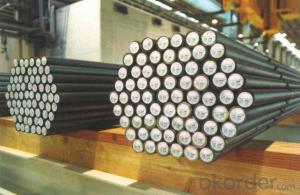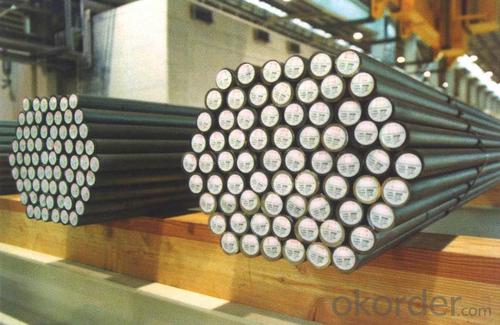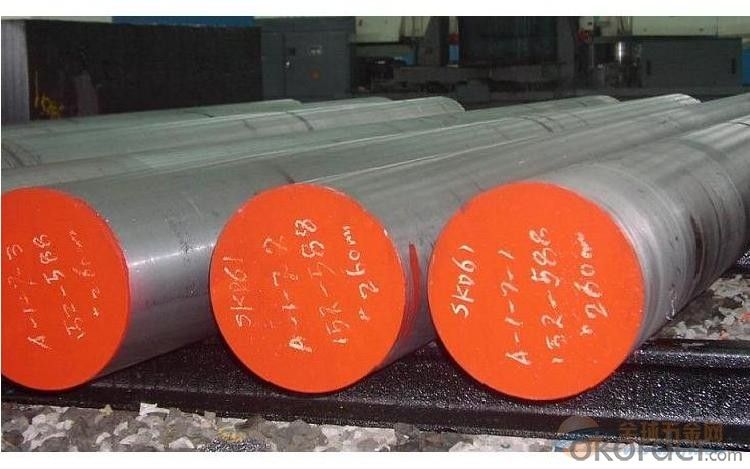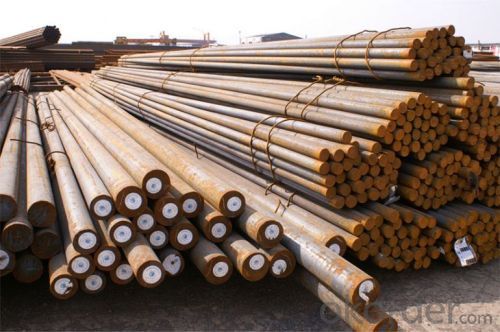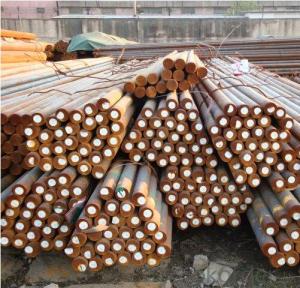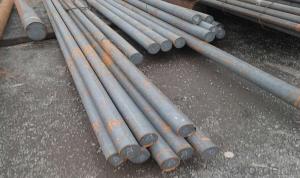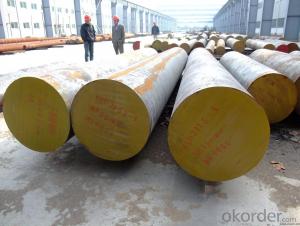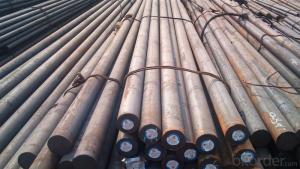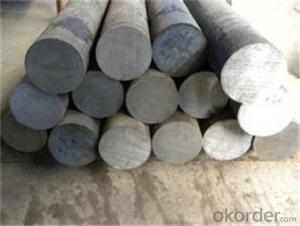SKD11 Hot Rolled 12mm Steel Rod, 1.2379 Steel Round Bar
- Loading Port:
- China main port
- Payment Terms:
- TT or LC
- Min Order Qty:
- 25 m.t.
- Supply Capability:
- 10000 m.t./month
OKorder Service Pledge
OKorder Financial Service
You Might Also Like
Specification
SKD11 Hot Rolled 12mm Steel Rod, 1.2379 Steel Round Bar
Product information:
1. Main application of skd11 steel:
(1) Thickness of not more than 2MM sheet, efficient blanking die, punch die and pressure die etc.
(2) All kinds of scissors, inserts, woodworking blade.
(3) Thread rolling die and wear-resistant slider.
(4) Cold Heading Die, thermosetting resin molding.
(5) Molding in deep drawing cold extrusion dies
2. Specification of skd11 steel:
| Round bar | Diameter(mm) | Length (mm) | |
| 10~800 | 2000~5800 | ||
| plate/sheet | Thickness(mm) | Width (mm) | Length (mm) |
| 10~800 | 80~2300 | 2000~5800 | |
3. Delivery condition of skd11 steel:
Acc. to your request—Standard steel bar(sawing)
——non-standard steel bar(sawing)
or Mill deliver condition,without sawing or cutting
Conventional or ESR, hot rolled or forged, black surface or milling
Hardness: annealed to HB≤255
4. Features of skd11 steel:
(1) Good quenching resistance, heat deformation small, wear-resistant, impact resistant.
(2) Vacuum degassing refining processing pure steel.
(3) Spheroidizing softening process, good cutting performance.
(4) Strengthen the elements vanadium, molybdenum special join, is extremely excellent in wear resistance.
5. Chemical analysis of skd11 steel:
| C | Si≤ | Mn≤ | P≤ | S≤ | Cr | Mo | V |
| 1.40~1.60 | 0.4 | 0.6 | 0.030 | 0.030 | 11.0~13.0 | 0.80~1.20 | 0.20~0.50 |
6. Compared grades of skd11 steel(based on usage)
| Chinese | American | German | Swedish | Japanese |
| GB | AISI | DIN | ASSAB | JIS |
| Cr12Mo1V | SKD11 |
7. Heat treatment of skd11 steel (for reference)
| quenching | quenching hardness | tempering | Tempering hardness |
| 1020~1040 °c | 58~60HRC | 150~200 °c | 62~63HRC |
Product show
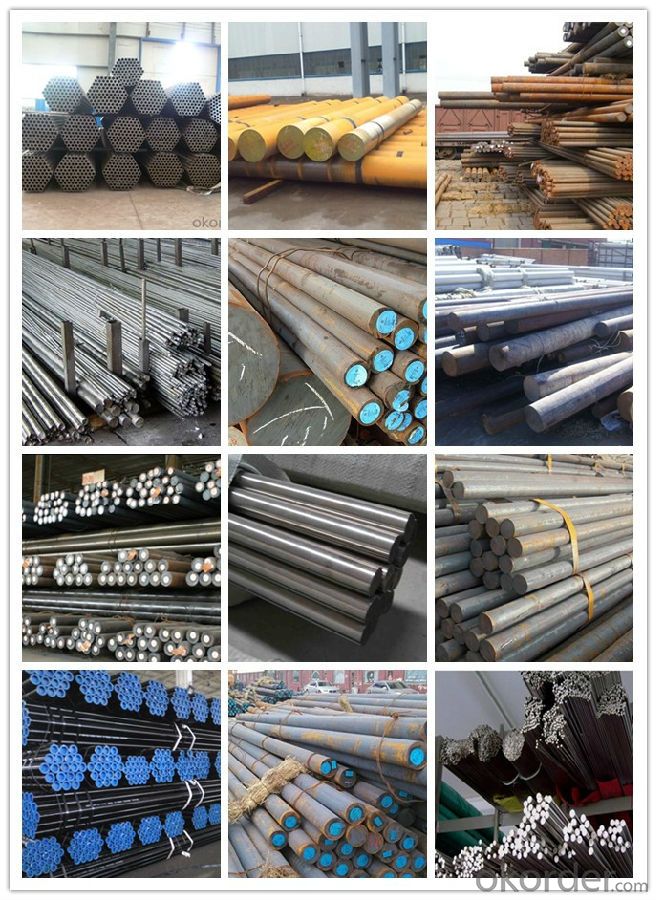
Workshop show
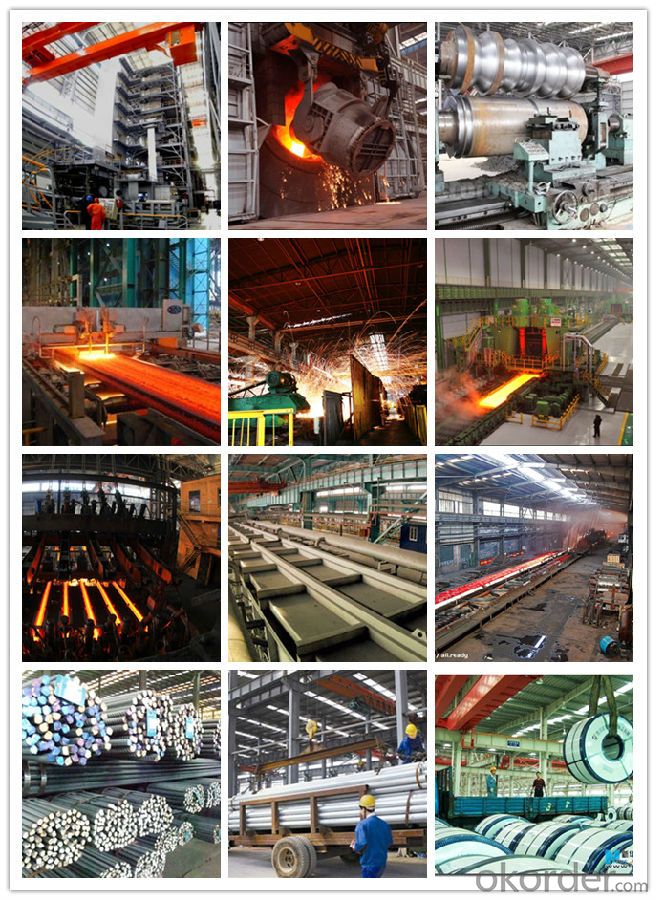
Our service:
-High manufacturing accuracy
-High strength
-Small inertia resistance
-Strong heat dissipation ability
-Good visual effect
-Reasonable price
Chose happens because of quality, then price, We can give you both.Additionally, we can also offer professional products inquiry, products knowledge train(for agents), smooth goods delivery, exellent customer solution proposals.Our service formula: good quality+good price+good service=customer's trust
SGS test is available, customer inspection before shipping is welcome, third party inspection is no problem.
If you need the sample, please feel free to let me know. Any question, we will contact you ASAP!
- Q: How does special steel perform in chemical resistance applications?
- Special steel is renowned for its exceptional performance in applications requiring resistance to chemicals. Its unique composition and properties render it highly impervious to corrosion and damage resulting from exposure to various chemical substances. Special steel is crafted using alloys that incorporate elements such as chromium, nickel, and molybdenum, which confer outstanding resistance to acids, alkalis, and other corrosive agents. In the realm of chemical resistance applications, special steel offers multiple advantages. Firstly, it exhibits remarkable resistance to pitting corrosion, a form of localized corrosion that manifests on metal surfaces. This characteristic renders it suitable for usage in environments where chemicals may inflict harm upon the metal surface. Secondly, special steel displays excellent resistance to crevice corrosion, which arises within confined spaces or gaps between metal surfaces. This property proves particularly advantageous in chemical processing equipment, where tight joints and connections are prevalent. Moreover, special steel retains its mechanical strength and integrity even in the harshest chemical environments. It can withstand high temperatures, pressure, and exposure to aggressive chemicals without compromising its structural robustness. This renders it exceedingly reliable and durable, ensuring an extended service life and reduced maintenance costs. All in all, the extraordinary chemical resistance properties of special steel make it the preferred choice for a wide array of applications. Whether employed in chemical processing plants, pharmaceutical industries, or oil and gas refineries, special steel offers the necessary safeguard against corrosion and chemical-induced damage. Its ability to endure harsh environments while maintaining optimal performance over time renders it an ideal material for chemical resistance applications.
- Q: How is special steel manufactured?
- Special steel is manufactured through a process called steelmaking, which involves combining iron with various alloying elements such as chromium, nickel, and molybdenum. This mixture is then heated and processed in electric arc furnaces or basic oxygen furnaces to remove impurities and adjust the chemical composition. The molten steel is further refined and cast into desired shapes or forms, followed by additional heat treatment processes like quenching and tempering to enhance its strength and special properties.
- Q: How does special steel perform in terms of creep resistance at elevated temperatures?
- Special steel is renowned for its outstanding ability to withstand creep deformation at high temperatures. Creep refers to the gradual distortion of a material under constant stress over an extended period of time at elevated temperatures. Special steel, specially designed to endure high temperatures, possesses an impressive capacity to resist creep and retain its structural integrity. The extraordinary creep resistance of special steel is attributed to its distinctive composition, which incorporates various alloying elements like chromium, molybdenum, and vanadium. These alloying elements enhance the steel's strength at high temperatures, augment its resistance to deformation, and hinder the formation of detrimental changes in its microstructure that can occur during creep. Moreover, special steel undergoes specific heat treatment procedures such as quenching and tempering, which further enhance its resistance to creep deformation. These procedures refine the steel's microstructure, resulting in a material that is fine-grained and uniform, enabling it to endure deformation even when exposed to high temperatures for extended periods. The exceptional creep resistance of special steel makes it the preferred choice in various industries that operate under high-temperature conditions, including power generation, petrochemicals, and aerospace. It provides extended service life, reduced maintenance requirements, and enhanced safety in critical applications where failure due to creep deformation could have severe consequences. In conclusion, special steel demonstrates remarkable performance in terms of its ability to resist creep deformation at high temperatures. Its distinct composition, including alloying elements and specific heat treatment procedures, empowers it to withstand deformation and maintain its structural integrity even under prolonged exposure to elevated temperatures.
- Q: How is special steel used in the aerospace manufacturing process?
- Special steel is used in the aerospace manufacturing process primarily for its strength, durability, and resistance to extreme temperature and pressure conditions. It is commonly employed in the construction of critical components such as turbine blades, landing gear, and structural parts of aircraft. The unique properties of special steel enable it to withstand the demanding environments and ensure the safety and reliability of aerospace systems.
- Q: What are the factors that affect the fatigue strength of special steel?
- There are several factors that can affect the fatigue strength of special steel. These factors include the composition and microstructure of the steel, the presence of impurities or defects, the surface finish and treatment of the steel, the applied stress levels, the temperature and environment in which the steel is used, and the presence of any residual stresses. Additionally, factors such as the frequency and amplitude of cyclic loading, the number of stress cycles, and the presence of any stress concentrations or notches can also impact the fatigue strength of special steel.
- Q: How does special steel contribute to the tool manufacturing industry?
- Special steel plays a crucial role in the tool manufacturing industry as it offers several advantages that enhance the quality, performance, and durability of tools. Firstly, special steel is known for its exceptional strength and toughness, which makes it ideal for manufacturing high-quality tools that can withstand heavy usage and extreme conditions. In addition to strength, special steel also offers excellent wear resistance. Tools made from special steel can retain their sharpness and cutting edge for a longer period, reducing the need for frequent re-sharpening or replacement. This not only saves time and effort but also increases productivity in various industries that heavily rely on tools, such as construction, automotive, and aerospace. Moreover, special steel can be heat-treated to achieve specific properties, such as hardness, which is vital for tools like drills, saws, and blades. This heat treatment process allows manufacturers to tailor the steel's characteristics to meet the specific requirements of different tools, ensuring optimal performance and effectiveness. Special steel also provides corrosion resistance, an essential feature for tools that may be exposed to moisture, chemicals, or harsh environments. By preventing rust and corrosion, special steel helps to prolong the lifespan of tools, reducing maintenance costs and ensuring their reliable performance over time. Furthermore, the versatility of special steel allows manufacturers to create tools with complex shapes and designs. This flexibility opens up opportunities for innovation and the development of specialized tools that cater to unique applications and industries. Special steel can be easily machined, welded, and formed into various tool designs, enabling manufacturers to create efficient and ergonomic tools that offer improved handling and user comfort. In summary, special steel significantly contributes to the tool manufacturing industry by providing strength, wear resistance, heat treatability, corrosion resistance, and versatility. These properties enable the production of high-quality tools that are durable, reliable, and efficient, meeting the demands of diverse industries and enhancing productivity.
- Q: Can special steel be used in the automotive industry?
- Yes, special steel can be used in the automotive industry. It is often utilized in various components and parts of vehicles due to its high strength, durability, and resistance to wear and corrosion. Special steel alloys can enhance the performance, safety, and efficiency of automobiles, making it a suitable choice for the automotive industry.
- Q: What are the advantages of using special steel in aerospace applications?
- There are numerous advantages to using special steel in aerospace applications. Firstly, special steel possesses high strength and excellent mechanical properties, making it ideal for withstanding extreme conditions encountered in the aerospace industry. It has the ability to withstand high temperatures, pressures, and vibrations, ensuring the safety and reliability of aircraft components. Secondly, special steel offers exceptional corrosion resistance, which is crucial in aerospace applications. Aircraft are exposed to harsh environments, including moisture, atmospheric gases, and various chemicals. Special steel's resistance to corrosion helps prevent degradation and maintains the structural integrity of the aircraft, reducing the need for frequent maintenance and repair. Additionally, special steel has excellent fatigue resistance, meaning it can endure repeated loading cycles without compromising its structural integrity. This property is particularly important in aerospace applications, where components are subjected to cyclic loading due to takeoffs, landings, and turbulence. By using special steel, the risk of fatigue failure is significantly reduced, ensuring the longevity and safety of the aircraft. Furthermore, special steel offers good weldability and formability, allowing for the production of complex and intricate aerospace components. This flexibility in manufacturing processes allows for customization and optimization of designs, resulting in lightweight yet robust structures. The use of special steel in aerospace applications contributes to the overall weight reduction of aircraft, leading to improved fuel efficiency and increased payload capacity. In conclusion, the advantages of using special steel in aerospace applications are its high strength, excellent mechanical properties, corrosion resistance, fatigue resistance, weldability, and formability. These properties make it an ideal material for withstanding the demanding conditions experienced in the aerospace industry, ensuring the safety, reliability, and efficiency of aircraft.
- Q: How does precipitation hardening enhance the strength of special steel?
- The process of precipitation hardening, which is also referred to as age hardening, serves to boost the strength of specific steel alloys through a heat treatment technique. This technique involves a series of steps that lead to the formation of small particles or precipitates within the microstructure of the material. The strength of special steel is mainly determined by the arrangement and interaction of its atoms. Initially, the atoms of the alloy are randomly distributed, resulting in a relatively soft and malleable substance. However, through precipitation hardening, the formation of precipitates during the heat treatment process plays a vital role in strengthening the steel. The process commences by subjecting the steel to a high temperature, referred to as the solution treatment or aging temperature. This elevated temperature allows the atoms to dissolve and form a solid solution. Subsequently, the alloy is rapidly cooled to preserve the supersaturated state of the solution. After the rapid cooling, the steel is exposed to a lower temperature, known as the aging temperature. During this stage, the dissolved atoms start to migrate and cluster together, forming small precipitates within the microstructure of the material. These precipitates act as obstacles to the movement of dislocations, which are the primary carriers of plastic deformation in metals. The presence of these precipitates hampers the movement of dislocations, making it more challenging for them to glide through the crystal lattice. Consequently, the strength of the steel is significantly enhanced. The dislocation obstacles provided by the precipitates increase the resistance to deformation, resulting in improved hardness and strength. Furthermore, the size, distribution, and uniformity of the precipitates play a crucial role in determining the extent of strength enhancement. Smaller and more evenly distributed precipitates offer a higher density of obstacles, leading to a greater strengthening effect. Additionally, the process of precipitation hardening also influences other material properties, such as corrosion resistance and toughness. To conclude, precipitation hardening strengthens special steel by creating small precipitates within its microstructure. These precipitates impede the movement of dislocations, increasing resistance to deformation and resulting in improved hardness and strength. This heat treatment process is pivotal in the development of high-performance special steel alloys utilized in diverse industries.
- Q: How does special steel contribute to the manufacturing of automotive engine components?
- Special steel plays a crucial role in the manufacturing of automotive engine components by providing enhanced strength, durability, and performance. Due to its unique properties, special steel is used in various critical engine parts, such as crankshafts, camshafts, connecting rods, valve springs, and cylinder heads. One of the primary benefits of special steel in automotive engine components is its exceptional strength. Engine parts made from special steel can withstand high stress, heavy loads, and extreme temperatures without deformation or failure. This strength ensures that the engine operates efficiently and reliably, even under demanding conditions. Moreover, special steel offers superior durability, which is essential for the longevity and performance of engine components. Special steel's resistance to wear, corrosion, and fatigue ensures that the engine parts maintain their functionality over an extended period. This durability translates into increased lifespan and reduced maintenance requirements for the engine, ultimately leading to higher customer satisfaction and lower costs for vehicle owners. The use of special steel in automotive engine components also contributes to improved performance. Special steel allows for the creation of lightweight components, reducing the overall weight of the engine and improving fuel efficiency. Additionally, the high precision and dimensional accuracy achievable with special steel manufacturing processes result in better engine performance, reduced friction, and improved power output. Furthermore, special steel offers excellent machinability, which simplifies the manufacturing process of engine components. Its ability to be easily formed, cut, and shaped enables the production of complex designs and intricate features, leading to enhanced efficiency and performance in the final product. In summary, special steel is vital in the manufacturing of automotive engine components due to its exceptional strength, durability, and performance. Its usage results in engines that are more reliable, efficient, and long-lasting, ultimately contributing to the overall quality and satisfaction of vehicles.
Send your message to us
SKD11 Hot Rolled 12mm Steel Rod, 1.2379 Steel Round Bar
- Loading Port:
- China main port
- Payment Terms:
- TT or LC
- Min Order Qty:
- 25 m.t.
- Supply Capability:
- 10000 m.t./month
OKorder Service Pledge
OKorder Financial Service
Similar products
Hot products
Hot Searches
Related keywords
